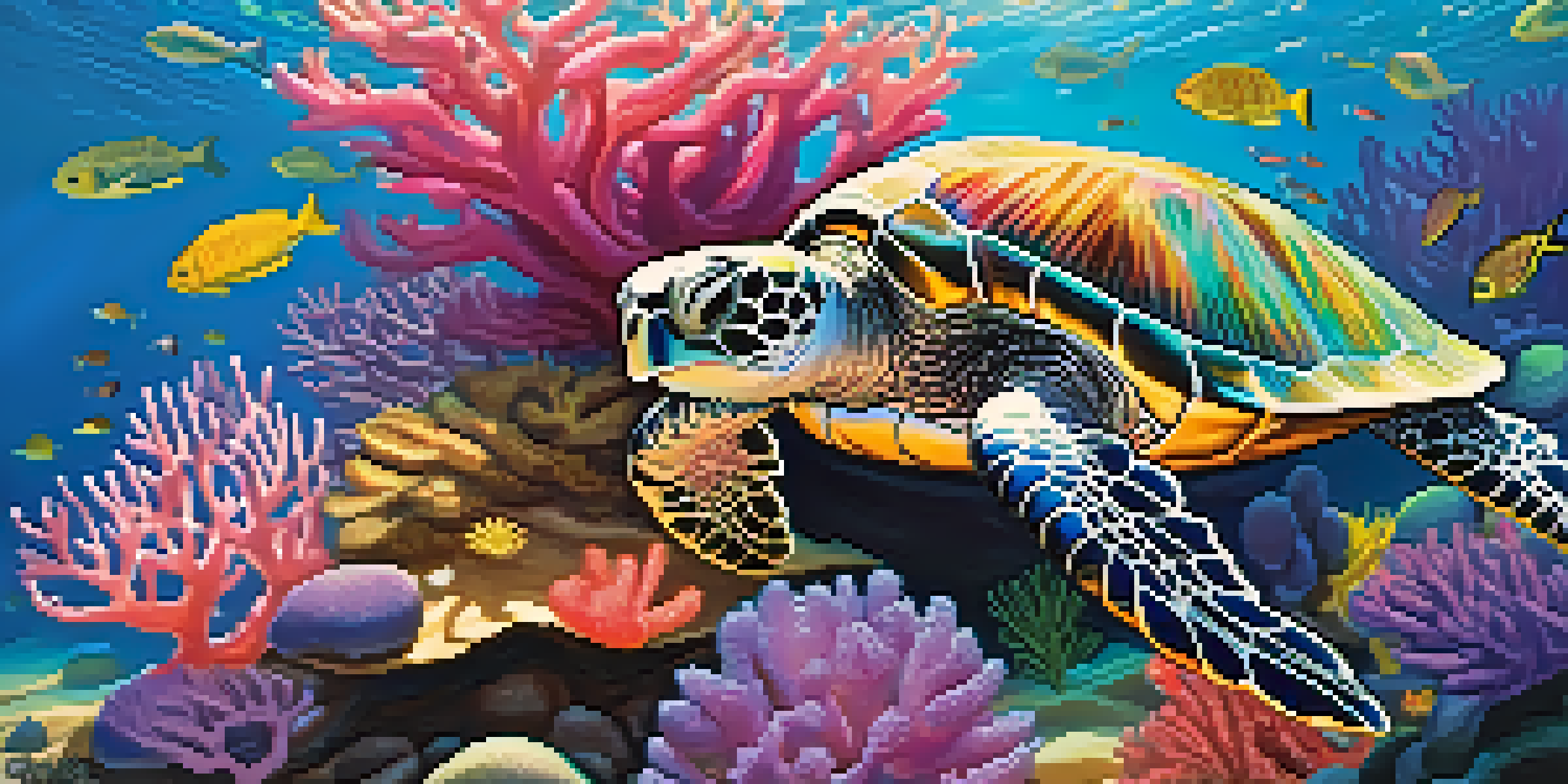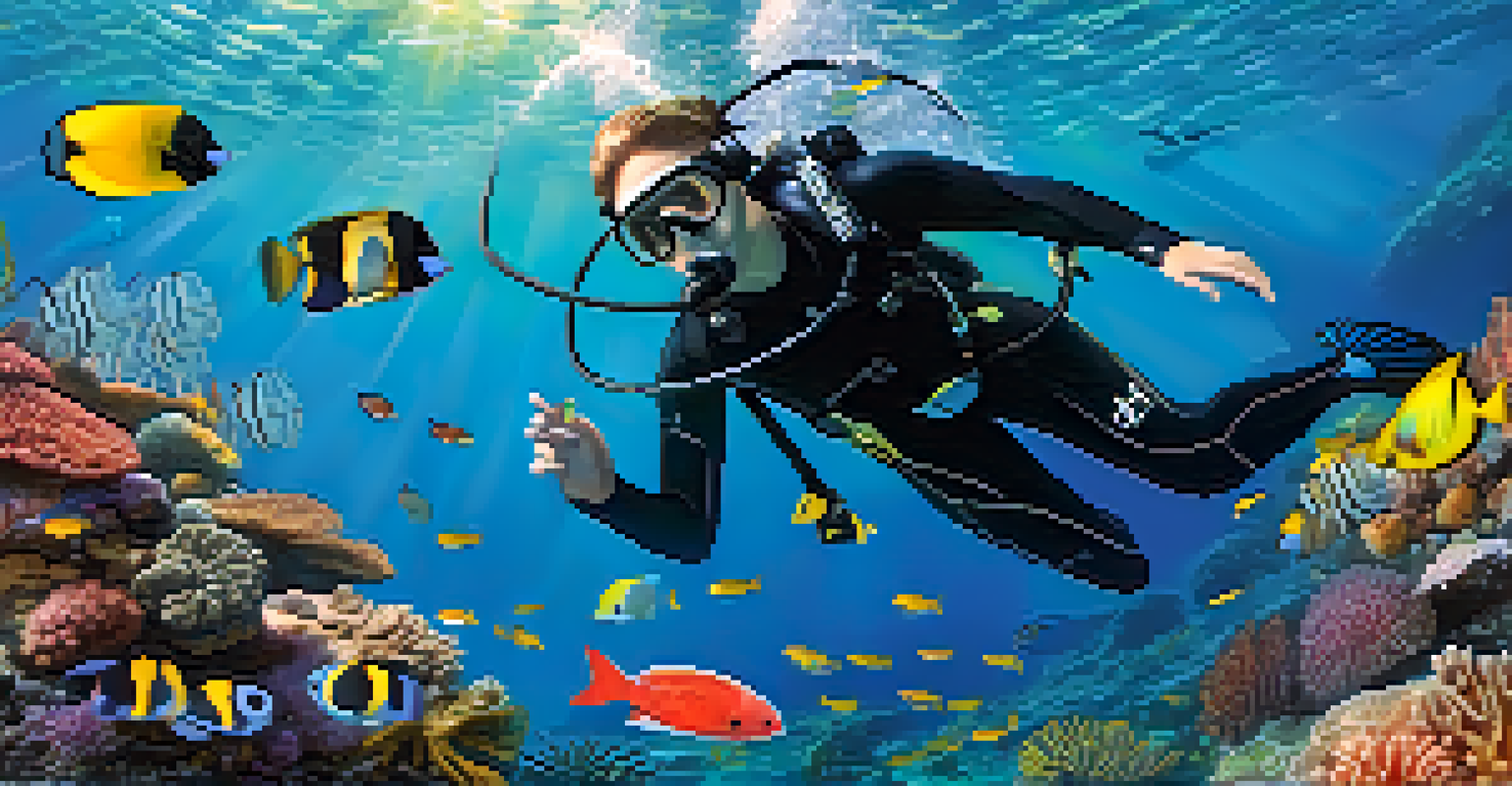Community Initiatives Supporting Marine Life in Honolulu Waters

Understanding the Importance of Marine Life
Marine life plays a crucial role in maintaining the health of our oceans and, by extension, our planet. From coral reefs that provide habitat for countless species to the fish that sustain local communities, every element is interconnected. In Honolulu, the vibrant marine ecosystem faces challenges, such as pollution and climate change, making community initiatives vital.
The sea, once it casts its spell, holds one in its net of wonder forever.
These initiatives not only aim to protect marine biodiversity but also educate residents and visitors about the importance of preserving these natural resources. By fostering a sense of responsibility towards local waters, communities can create a culture of stewardship. It’s about recognizing that our actions have consequences, and every small effort counts.
Understanding the importance of marine life is the first step in mobilizing communities. As people become more aware of the stakes, they are more likely to get involved in initiatives aimed at conservation. The ocean is not just a backdrop for beautiful beaches; it’s a living system that needs our care and attention.
Local Organizations Making a Difference
Honolulu is home to several organizations dedicated to marine conservation. Groups like the Hawaiian Islands Humpback Whale National Marine Sanctuary and the Oceanic Institute work tirelessly to protect marine habitats and educate the public. Their efforts range from research and advocacy to hands-on restoration projects.

These organizations often rely on community volunteers to help with cleanups, monitoring marine health, and educational outreach. For instance, beach cleanups not only remove trash but also raise awareness about pollution's impact on marine life. Volunteers leave with a deeper understanding of the challenges faced by local waters and the importance of their role in conservation.
Community Engagement is Vital
Active community involvement is essential for marine conservation efforts, fostering a shared responsibility among residents.
Through collaboration and community involvement, these organizations amplify their impact, creating a network of support for marine ecosystems. The collective effort demonstrates how much can be achieved when individuals come together for a common cause. It's a powerful reminder that we all share responsibility for the health of our planet.
Engaging the Community Through Education
Education is key to fostering a community that cares about marine life. Programs in schools and local workshops teach both children and adults about the ecological significance of the ocean. By instilling this knowledge early on, we can cultivate a future generation of ocean advocates.
We won't have a society if we destroy the environment.
Interactive activities, such as beach field trips and virtual learning sessions, make the learning process engaging and memorable. When people experience the beauty of marine life firsthand, they are often motivated to protect it. This hands-on approach reinforces the idea that every person can make a difference.
Moreover, educational initiatives often involve local cultural practices, highlighting the deep connection between Hawaiian traditions and the ocean. By integrating cultural perspectives, these programs become more relatable and impactful. It’s a beautiful blend of knowledge that honors the past while nurturing the future.
Community Clean-Up Events: A Hands-On Approach
Clean-up events are a popular way for communities to come together and make a tangible impact. In Honolulu, local beaches and coastal areas frequently host these gatherings. Participants often find joy in working side by side with friends and family while contributing to a cleaner environment.
These events not only clear debris from the shoreline but also promote awareness about the harmful effects of litter on marine life. For instance, plastic waste can entangle sea turtles or be ingested by fish, leading to dire consequences. By witnessing the amount of trash collected, volunteers leave with a heightened sense of responsibility.
Education Drives Conservation Action
Educational programs play a key role in raising awareness about marine ecosystems, inspiring individuals to take protective actions.
Moreover, community clean-ups often include educational components, where participants learn about the local marine ecosystem. This combination of action and education empowers individuals to take further steps in their daily lives to reduce waste and protect the ocean. It’s a rewarding way to bond with nature and fellow community members.
Innovative Conservation Projects in Honolulu
Honolulu is also home to several innovative projects aimed at conserving marine life. For example, coral restoration projects involve growing coral in nurseries before transplanting them into damaged reefs. This approach has shown promising results in rebuilding habitats and restoring biodiversity.
Another fascinating initiative includes the use of technology for monitoring marine health. Underwater drones and remote sensing equipment allow researchers to gather data on fish populations and water quality. These tools help scientists understand changes in the ecosystem and inform conservation strategies.
Such projects not only address immediate environmental concerns but also inspire community involvement through citizen science programs. Locals can participate in data collection and monitoring, giving them a sense of ownership over their marine environment. Innovation and community engagement go hand in hand in these efforts.
The Role of Local Government in Marine Conservation
Local government plays a crucial role in supporting initiatives aimed at protecting marine life. In Honolulu, policies and regulations help safeguard marine habitats and promote sustainable practices. For instance, the establishment of marine protected areas allows ecosystems to recover and thrive.
Government support can also enhance community initiatives by providing funding and resources. Grants for educational programs or conservation projects enable organizations to expand their reach and impact. Collaboration between government and community organizations often leads to more effective solutions.
Innovative Projects Enhance Recovery
Innovative conservation projects, such as coral restoration and technology use, are crucial for rebuilding marine habitats and engaging the community.
Moreover, public awareness campaigns initiated by local authorities help engage citizens in marine conservation efforts. By highlighting the importance of clean oceans and healthy marine ecosystems, these campaigns encourage individuals to take action. When government and community come together, they create a powerful force for positive change.
The Future of Marine Life in Honolulu Waters
The future of marine life in Honolulu waters hinges on continued community engagement and innovative conservation efforts. As awareness grows, so does the number of individuals and organizations committed to protecting these vital ecosystems. It's an empowering shift that promises hope for the ocean's health.
However, challenges remain, including climate change and pollution, which require ongoing attention and action. The collective efforts of residents, organizations, and local government will be critical in addressing these issues. By remaining vigilant and proactive, we can ensure that future generations inherit a thriving marine environment.

Ultimately, the journey toward marine conservation is ongoing. Each initiative, no matter how small, contributes to a larger tapestry of efforts aimed at protecting the ocean. Together, the community's passion for marine life can lead to a brighter future for Honolulu's waters and the incredible ecosystems they support.